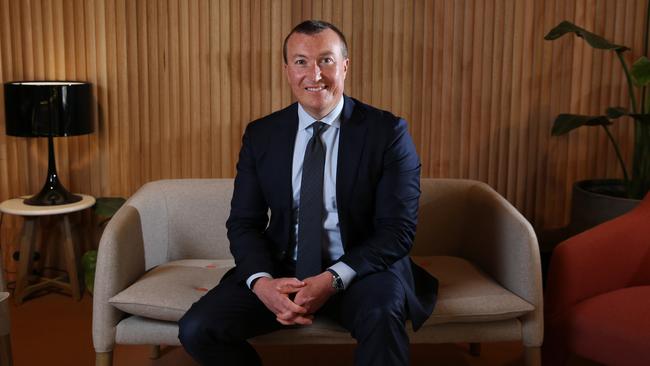Call to let business, not government, take lead on research and development investment
Corporate Australia is urging Anthony Albanese to urgently overhaul research and development incentives so local businesses can stay competitive as the incoming Trump administration plans to slash taxes in the US.

Corporate Australia is urging Anthony Albanese to urgently overhaul research and development incentives so local businesses can stay competitive as the incoming Trump administration plans to slash taxes in the US.
With neither Labor nor the Coalition proposing lowering the company tax rate, despite Donald Trump vowing to cut it to 15 per cent in the US, the Business Council of Australia says the government needs to immediately raise the cap on R&D incentives from $150m to at least $250m “so private companies, not government, can invest more in Australia”.
The push for bigger tax breaks to encourage the private sector to invest in the creation of new services or products differs from Labor’s Future Made in Australia agenda, which provides a more active role for government to support sectors with growth potential.
The BCA says the overhaul should be part of a new national goal to grow R&D spending from 1.7 per cent of Australia’s gross domestic product to 3 per cent. The business lobby group says R&D spending in the US is 3.5 per cent, with incentives likely to become more enticing for businesses under the new administration.
BCA chief executive Bran Black said Australian jobs and investment could be lost overseas unless there were immediate changes to R&D rules.
“Our competitive settings already lag those of the US, and the new administration promises to make America an even more enticing destination for investment with a possible further lower company tax rate and deregulation agenda,” he said.
Mr Black said increasing the $150m cap — which would effectively lower business taxes — should be implemented ahead of a bigger overhaul under the government’s R&D review, which is not due to report until the end of 2025.
“The BCA believes abolishing the R&D expenditure threshold, or at a minimum increasing it to $250m and indexing it, would create a better incentive for investment,” he said.
“If the threshold were removed, we could see a flurry of Aussie innovations that help solve some of our biggest challenges, including those in defence, energy, health and cyber.”
A day after Mr Trump’s election victory in November, corporate leaders revived calls for Labor to lower the corporate tax rate, saying Australian businesses would be increasingly uncompetitive under the president-elect’s plan to slash company taxes in the US to as low as 15 per cent.

The corporate tax rate in Australia is 25 per cent for companies with a turnover of less than $50m and 30 per cent for bigger businesses — the third highest in the OECD. Neither Labor nor the Coalition has committed to lowering the company tax rate, just weeks out from Mr Trump’s inauguration.
A spokesman for Jim Chalmers said the government had other priorities on tax reform, when asked whether Labor was considering lowering the company rate.
“When it comes to tax reform, our focus is on our tax cuts for every taxpayer, ensuring multinationals pay a fairer share, our changes for high balance super accounts, changes to the petroleum resource rent tax, and incentives to support small business and encourage investment in areas like housing and clean energy,” a spokesman for the Treasurer said.
He said the government had an “ambitious and substantial agenda to make the Australian economy more competitive, dynamic and productive”.
“At the heart of this is our five pillar productivity agenda which is all about lifting incomes and living standards and creating more opportunities for more people in more parts of our country,” Dr Chalmers said.
“This agenda includes our $900m National Productivity Fund to drive competition reforms through states and territories, the biggest reform to our merger system in almost 50 years, abolishing nearly 500 nuisance tariffs, boosting competition across our financial system, reforming skills and education, establishing a comprehensive review of R&D, reforming the delivery of aged care, modernising our energy grid, tasking the Productivity Commission with five new inquiries across the five pillars and more.
“Business investment is up under our government and fell under our predecessors.”
Opposition Treasury spokesman Angus Taylor has said the Coalition was committed to delivering lower taxes but he has offered little detail on policies.
“Under Labor, business is suffering through a combination of higher costs, more red tape and higher taxes,” Mr Taylor said.
“Growing competitive and productive companies is essential to growing our economy and delivering the revenue that funds our essential services.
“The Coalition is committed to delivering tax reform that delivers lower, simpler, fairer taxes.
“As a first priority, a Coalition tax policy prioritises delivering for families and small business and driving sector-neutral investment settings.”
Mr Taylor said the Coalition would make the instant asset write-off permanent, allowing small businesses to receive an immediate tax deduction for the cost of investments up to $30,000.
“This is a structural change to our company tax system that will simplify depreciation for 2.5 million small businesses. It is a major commitment that will reward 98 per cent of Australian businesses when they choose to invest to grow their businesses and grow the economy,” Mr Taylor said.
Liberal MPs told The Australian there was unlikely to be further policies rolled out by Peter Dutton until he unveiled a reshuffle of shadow cabinet later this month.
Some MPs are tipping Dan Tehan to replace Simon Birmingham in the foreign affairs portfolio.




To join the conversation, please log in. Don't have an account? Register
Join the conversation, you are commenting as Logout